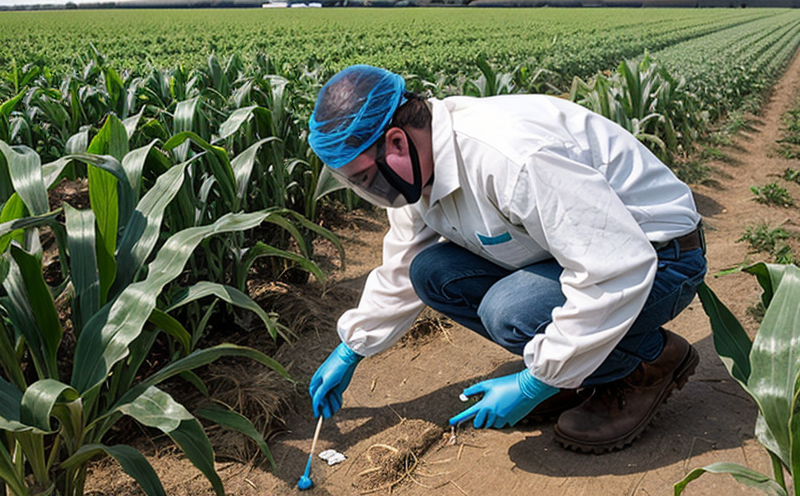Organophosphate Pesticide Residue Testing
The testing of organophosphate pesticide residues in crops is crucial to ensure food safety and comply with international standards. Organophosphates are a group of pesticides that can have harmful effects on human health if consumed in excess, particularly affecting the nervous system. Therefore, accurate residue detection is vital for both producers and consumers.
Our laboratory specializes in providing comprehensive testing services for organophosphate pesticide residues using validated analytical methods such as Liquid Chromatography-Mass Spectrometry (LC-MS/MS). This technique allows us to detect even trace levels of these chemicals, ensuring that the results are reliable and precise. The process involves several key steps:
- Sample Collection: Representative samples must be collected from various parts of a crop field or storage facility.
- Preparation: Samples undergo thorough preparation including extraction, concentration, and purification to ensure accurate detection.
- Analytical Testing: Once prepared, the extracts are analyzed using LC-MS/MS technology, which provides high sensitivity and specificity for identifying organophosphate residues.
- Result Interpretation
The importance of this testing cannot be overstated. It helps in maintaining food safety standards by ensuring compliance with regulatory limits set by organizations like the World Health Organization (WHO) and Food and Agriculture Organization (FAO).
We also provide detailed reports that include all relevant data along with interpretation, which can assist quality managers and R&D engineers in making informed decisions about production processes.
Industry Applications
The application of organophosphate pesticide residue testing is wide-ranging across the agricultural sector. Quality managers rely on these tests to ensure product safety before it reaches market shelves, while compliance officers use them to stay ahead of regulatory changes and ensure adherence.
- Certification Programs: Our services support certification programs that aim at reducing pesticide residues in crops without compromising yield.
- Supply Chain Management: By integrating our testing into their supply chain, companies can maintain transparency and traceability throughout the production process.
- Research & Development: R&D engineers benefit from our services by gaining insights into potential issues related to pesticide usage within crops.
- Procurement: Procurement teams ensure that they source only safe products, thereby protecting their brand reputation and customer trust.
In summary, organophosphate pesticide residue testing plays a critical role in safeguarding public health by ensuring the safety of agricultural produce. Our services cater to these diverse needs, offering precise and reliable results every time.
Quality and Reliability Assurance
At our laboratory, we adhere strictly to international standards such as ISO 17025 for quality assurance and reliability in testing and calibration laboratories. This ensures that all tests conducted here meet the highest industry benchmarks.
The process begins with rigorous training of our staff on the latest techniques and technologies used in pesticide residue analysis. Our analysts are certified by reputable bodies, ensuring they possess the necessary skills to handle complex samples accurately.
We utilize state-of-the-art equipment like LC-MS/MS systems that offer unparalleled precision and accuracy. These instruments allow us to detect even minute traces of organophosphates, which would otherwise go undetected in less sophisticated setups.
Additionally, we maintain strict quality control measures throughout the testing cycle from sample preparation through final analysis. Each step is meticulously documented for traceability purposes, allowing us to provide detailed reports that meet regulatory requirements and industry expectations.
International Acceptance and Recognition
Our organophosphate pesticide residue testing service is internationally recognized for its accuracy and reliability. Below is a list of some key standards that our methods comply with:
- ISO 17025: Quality management system requirements for calibration laboratories.
- AOAC International Methods: Analytical methods developed by the Association of Official Analytical Chemists.
- USDA Standards: United States Department of Agriculture guidelines applicable to food safety and quality assurance.
- FAO/WHO Guidelines: Recommendations from the Food and Agriculture Organization and World Health Organization regarding pesticide residue limits in foods.
- EU Regulations: European Union directives concerning agricultural products and their safety standards.
By adhering to these stringent guidelines, we ensure that our results are accepted worldwide and can be used confidently by clients operating across multiple countries.





